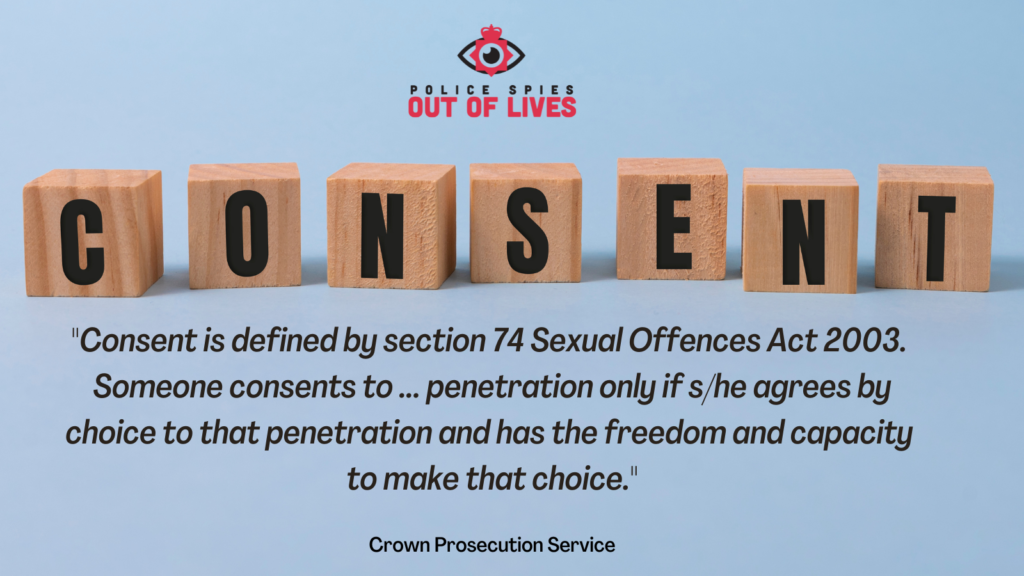
For women like us, this new report advocating change to the laws on consent and deception is a welcome contribution to a debate that is more complicated than it might first seem.
On January 18th 2023, we attended the Criminal Legal Reform Now Network’s launch where Harriet Wistrich explained our cases, in particular that of ‘Monica’, that are referenced in the report.

In December last year, we submitted our response to the Crown Prosecution’s consultation about sex by deception which seemed primarily concerned with deception by gender. We believe, however, that deception as to gender cannot be looked at in isolation from other forms of deception in sexual relationships.
For those who have followed our campaign for a while, you will know that we are clear on this: our relationships with undercover officers were not consensual. You will also know that the CPS told us we were wrong and the officers had no case to answer because ‘genuine feelings’ were involved. And then in December 2018 that the courts rejected Monica’s judicial review and upheld the CPS decision.
In a parallel universe, it seems, in May 2021 during his evidence to the Undercover Policing Inquiry, ex-undercover officer Vincent Harvey who had a deceitful relationship with ‘Madeleine’ admitted that he knew ‘Madeleine’ would not have consented to a sexual relationship with him had she known who he was:
Q: Would “Madeleine” have slept with someone she knew to be an undercover police officer?
A: No.
[See: https://www.ucpi.org.uk/wp-content/uploads/2021/05/20210511-ucpi-t1_p2-evidence_hearings-transcript.pdf]
The deception perpetrated by undercover police violated our right to sexual autonomy and resulted in severe emotional and psychological harm to many of us. Our ‘consent’ to sexual activity with those men was fraudulently obtained. They knew that we would never have consented to sex with them had we known who they really were. Their deception removed our ability to meaningfully consent – our freedom to make decisions based on our own priorities and values.
The application of the law relating to consent is confused and inconsistent and its implementation has failed to protect some types of victims and allowed many perpetrators to escape justice. For this reason, we are pleased to see lawyers engaging with this issue and proposing change. We have some concern, however, with a couple of details. In particular, clause 4A 1(d) and 4A (3), as follows:
4A. Inducing a person to engage in sexual activity by deception
- (1) A person (A) commits an offence if—
- (a) A deceives another person (B);
- (b) A intends by his deception to induce B to engage in sexual activity;
- (c) B engages in sexual activity;
- (d) B’s decision to engage in sexual activity is induced by A’s deception; and
- (e) A has no reasonable excuse for deceiving B.
And:
(3) Where evidence is provided of a reasonable excuse for A’s deception, it will be for the prosecution to prove that there was no reasonable excuse.
We worry this ‘reasonable excuse’ would be a get out of jail free card for undercover cops & other covert human intelligence sources (CHIS). ‘A’ may have a reasonable excuse for deceiving ‘B’, but that shouldn’t be relevant to having sex and it feels like 4A 1(d) & (3) are muddying the waters
We understand the need to create space for a defence but we have bitter experience of the Met police’s misogyny, lies and self-preservation instinct. We think the officers could argue that infiltrating our groups was a reasonable excuse to deceive their ‘legitimate targets’; that the sex was an add-on extra and that their ‘reasonable excuse’ means they are not culpable of this offence.
We know the guidelines say no relationships these days and we know we’ve had an apology. But with the lack of limits in the CHIS act (which fails to specifically prohibit rape, murder or torture), we fear that state-perpetrators of sex by deception might use this clause to wriggle their way out of being found guilty of a crime. Again.
State involvement in the deception we were subjected to is what makes our cases unique. But that doesn’t mean there aren’t lots of them. We know of more than fifty women deceived into sex by policemen employed by Special Branch (SB). The SDS and NPOIU – the SB units who cultivated these spycop abusers – are approximately 5% of undercover policing in the UK. So how are the other 95% of undercover police behaving? What scrutiny is there of these deployments? How many more women have been deceived by on-duty police officers wearing their own clothes?
Like everyone else we’re shocked and horrified by recent stories of rape and murder by uniformed officers. The institutional misogyny in the so-called elite units and elsewhere is clear for all to see. If this is how the uniformed officers behave, what on earth is going on undercover?
It’s time for the laws on consent to change but this law must apply to perpetrators including those employed by the state: undercover police, agents of the security services and their informers must be stopped from acting as a law unto themselves. Without this line in the sand, we have no faith that state-sponsored sexual abuse will stop.

